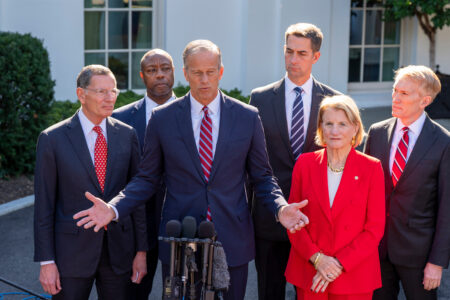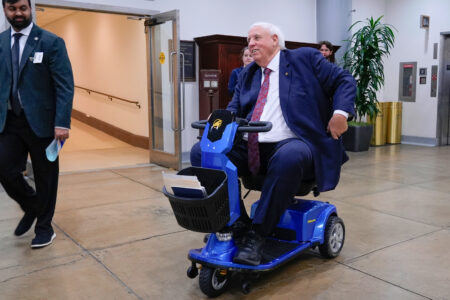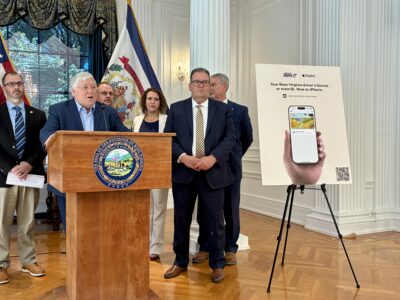Federal Government Shutdown Enters Day 24

Senate Majority Leader John Thune, of S.D., second from left, and other republican Senate members, speak with reporters after a meeting with President Donald Trump at the White House, Tuesday, Oct. 21, 2025, in Washington. (AP Photo/Alex Brandon)
CHARLESTON — Today will mark day 24 of the federal government shutdown due to disagreements in the U.S. Senate over continuing funding resolutions between Republicans and Democrats, with the impasse likely to continue until at least the beginning of November.
The U.S. Senate voted Wednesday 54-46 for H.R.5371, the Continuing Appropriations and Extensions Act passed in September by the U.S. House of Representatives, but the vote once again did not reach the 60-vote cloture threshold to overcome a filibuster.
U.S. Sens. Catherine Cortez Masto, D-Nev., John Fetterman, D-Pa., and Angus King, I-Maine, continue to vote with Senate Republicans to pass the House continuing resolution that would keep the government funded through Nov. 21.
If U.S. Sen. Rand Paul, R-Ky., changes his vote to yes the next time the CR comes to a vote next week, five more Democratic senators would be needed to overcome the 60-vote threshold and avoid a filibuster.
Both U.S. Sens. Shelley Moore Capito and Jim Justice continue to vote yes on the House CR. During separate virtual press briefings with West Virginia reporters Thursday morning, Capito and Justice placed the blame on the impasse on Democratic lawmakers led by Senate Minority Leader Chuck Schumer, D-N.Y.
“We have a bipartisan bill that we were getting three Democrats on. It has a quite simply no-strings-attached reopening,” said Capito, R-W.Va. “Schumer won’t let his caucus vote for this, so basically we’re in a holding pattern.”
“This shutdown to me is the most ridiculous thing on the planet. To be perfectly honest it’s shameful. It’s selfish,” said Justice, R-W.Va. “If this were a Republican issue you know me well enough to know that I would tell you that. But this issue in my opinion lies right on the backs of the Democrats.”
Instead of supporting the House CR, the Senate Democratic caucus has its own CR that would fund the government at current levels and permanently extend tax credits put in place during the COVID-19 pandemic for health insurance coverage through the Affordable Care Act (ACA). Those subsidies expire at the end of December, which will cause premiums to spike and some to lose their health care coverage.
Senate Republican leadership has said it will negotiate with Democratic lawmakers on ACA subsidies but not while the government remains shut down. Senate Democrats have said they don’t trust Republican lawmakers and President Donald Trump to keep their word. Insurance companies are expected to announce their upcoming insurance premiums on Nov. 1
Capito said she is willing to negotiate, but the ACA subsidy package in their CR would cost taxpayers $1.4 trillion.
“Their idea is to spend $1.4 trillion and spend all kinds of money on issues in areas that we disagree with and I disagree with,” Capito said. “We were at the White House on Tuesday and had lunch with the President. The President is very much in line with what we believe in: that is if you open the government, we will begin to negotiate. You cannot hold the government hostage. You can’t hijack the government for a policy issue.”
Justice said Congressional Democrats are attempting to use the government shutdown for the 2026 midterm election season and to distract from what he said were successes by Trump and Republican lawmakers.
“You know, it’s a way for them to have a cause to run on in the midterm re-elections,” Justice said. “They don’t have anything to grab on to, whether it be the border or the tax cuts or whatever it may be…Really, what are the Democrats doing? They’re absolutely holding America hostage.”
Meanwhile, non-essential federal workers remain furloughed or even laid off in some cases. Military personnel, law enforcement, air traffic controllers and other essential federal employees are continuing to work without pay, with the possibility of backpay being questioned.
The Senate voted Thursday 54-45 on S.3012, the Shutdown Fairness Act, but again, the bill was unable to reach the 60-vote cloture needed to be fully considered. The bill would allow certain essential federal employees to get paid retroactive to Oct. 1. While both Capito and Justice voted for the bill, they both acknowledged prior to the vote that the measure was unlikely to get enough Democratic support.
“Apparently, Senator Schumer instructed the Democrats in the center to vote against this one as well last week,” Capito said. “I think it’s a disservice to those men and women who are working. I know they’re getting impatient. Believe me, I see them when I go to the airport and to other places. I’m going to vote to pay the essential employees. I would hope that we could reopen the government and pay everybody as soon as possible.”
“I do not think it’ll pass today,” Justice said. “I think what will happen is the talks behind closed doors will continue. I really think that ultimately the leader of the band, President Trump, will surface in a really strong way and then I think we’ll get a resolution to this.”
Other federal programs are feeling the effects of the federal government shutdown, including the Supplemental Nutrition Assistance Program (SNAP).
“Quite honestly I don’t want to leverage a farm service worker or SNAP benefit to give people leverage up here on Capitol Hill,” Capito said. “That is a total disservice, holding people now hostage in terms of their ability to get a federal benefit or to get a federal paycheck that they’ve worked for. I would say stop the leverage, stop the politics, reopen the government and we will begin to negotiate on the issues that have been brought forward.”
“People don’t care if it’s the Republicans or Democrats fault, but they absolutely have to have these dollars, these SNAP benefits,” Justice said. “They have to have them and if they don’t have them, families are going to get really, really, really hurt.”
The West Virginia Department of Human Services announced Saturday that SNAP benefits set to begin after Oct. 16 would be delayed and SNAP benefits for November could also face delays.
Speaking during a press conference Thursday afternoon, Gov. Patrick Morrisey said he was expediting $1.1 million appropriated by the West Virginia Legislature for the current fiscal year for the state’s two largest food banks, Mountaineer Food Bank and the Facing Hunger Foodbank, as well as urging the public to donate to their local food pantries. But the state would not be able to shoulder the cost of replacing SNAP benefits in the short-term.
“I’m going to keep talking with (the state Department of Human Services) and others,” Morrisey said. “I know they’re looking at different options. We want to make sure that people that are hungry, we’re very empathetic to the conditions they’re going through. I wanted to start the process and to help accelerate what goes to the food banks.”





